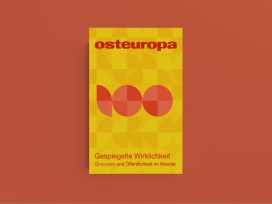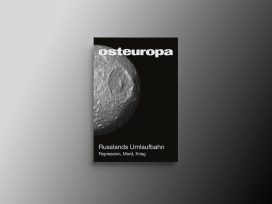Abstracts Osteuropa 7/2005
OTTO LUCHTERHANDT
Legal nihilism in action
The Yukos-Khodorkovsky trial in Moscow
The conviction of Mikhail Khodorkovsky and Platon Lebedev as villainous
figures guilty of white collar crime will go down in history as a
spectacular scandal of justice in the history of Russia in the twenty-first
century. By serving as the henchmen for Russia¹s executive branch, which
has long since grown all but omnipotent, the general prosecutor and the
courts have fabricated a criminal case by systematically and cynically
violating basic principles of rule of law. A defeat for Russia at the
European Court of Human Rights in Strasbourg has been pre-programmed.
ANGELIKA NUSSBERGER & DMITRII MARENKOV
Quo vadis iustitia?
The Khodorkovsy case in light of jurisprudence concerning the European Convention of Human Rights
Initial reactions to the judgement against entrepreneur Mikhail
Khodorkovsky on 31 May 2005 focused on criticising violations against
basic precepts of rule of law. Since it is impossible to appeal to the
Russian Constitutional Court to review such violations of basic rights
by the executive and the judiciary, the European Court of Human Rights
in Strasbourg remains the only instance of control. The court in the
past three years has issued a series of decisions against the Russian
Federation, in which a number of violations of the European Convention on
Human Rights were criticised. Based on these precedents, it appears that
a condemnation of the Russian Federation can be expected in the
Khodorkovsky case as well. Whether it will come to this is unclear given
current developments in relations between the Russian Federation and the
Council of Europe.
LEV GUDKOV & BORIS DUBIN
The oligarch as public enemy
How the Khodorkovsky case benefits the Putin regime
The Yukos trial is a yardstick for the state of politics and society in
Russia. Analysis of public reaction to Mikhail Khodorkovsky¹s arrest,
the mass media campaign against him, and his trial reveal how the
proceedings unfolded to form a seamless transition to the authoritarian
subjugation of politics, economics, and society that Putin and his
following of spooks are pursuing. The uninformed masses provide the
state with reliable support. Phenomena thought to have been overcome
friend-foe logic, a militarized defence mindset and Orwellian
double-think are returning. The term “oligarch” has been transformed
into an appellative figure that fulfils a function similar to that of
the earlier formulation “enemy of the people”. At the same time, the
population is reacting to developments with growing cynicism. This
cynicism is undermining the basis of Putin¹s regime and destabilizing
his concept of “managed democracy”.
JULIA KUSZNIR
The state strikes back
Economic policy consequences of the Yukos Affair
On 31 May 2005, a key chapter of the Yukos affair, which began in the
summer of 2003, came to an end. Mikhail Khodorkovsky, the former chief
executive and main shareholder of the oil conglomerate Yukos, was
sentenced to nine years in prison. Simultaneously, state tax
investigators have brought what was once the largest oil company in
Russia to the brink of bankruptcy. The Yukos affair is an indicator for
the quality of Russia¹s legal system, the government¹s orientation in
economic policy, and the relationship between President Vladimir Putin
and influential large businesses.
REINHOLD VETTER
Who are the real Europeans?
Central-eastern Europe and the EU crisis
For the new members of the European Union, the looming failure of the EU
constitution ratification process and the EU¹s current crisis mean both
a caesura and a new challenge. Decision-makers in Warsaw, Prague,
Bratislava, and Budapest also feel the sense that things cannot go back
to the way they were. The debate on Europe is not just about who is for
and against the constitutional treaty, but about the future shape of the
EU. Will there be additional rounds of enlargement? Which integrating
steps are preconditions for further enlargement? And who will be the
future motor of integration? There is much to suggest that east central
Europe will serve as a centre of European reform in the future.
OLEH RYABCHUK
The European idea unites the Ukrainians
The year 2004 will enter European history books as an important
milestone in “the era of the great integration”. The European Union¹s
eastern expansion and the “Orange Revolution” in Ukraine are closely
linked. With its peaceful revolution, Ukraine showed that it is an
organic component of democratic Europe. The EU is called on not to make
promises that it cannot fulfil, but to offer Ukraine a clear perspective
for EU accession so that the country can see to the tasks of
Europeanization at home. Ukraine will reject no form of cooperation so
long as it serves the strategic goal of full EU membership.
IVO BOCK
“Not suitable for publication”
Czech censorship in literature, 1948-1968
Between 1948 and 1968, Czech literary censorship went through several
phases that differed according to the censorship criteria in force and
the competence and assertiveness of certain censorship agencies. While
the management of publishing houses and editorial boards saw to the
suppression of undesirable information during the Stalin era, the
censorship office, which was established in 1953, saw itself as the
central control agency during the thaw. Starting in 1963, however, this
office was increasingly forced to water-down criteria and to accept
objections to its decisions.
Published 26 July 2005
Original in English
Contributed by Osteuropa © Osteuropa
PDF/PRINTNewsletter
Subscribe to know what’s worth thinking about.



